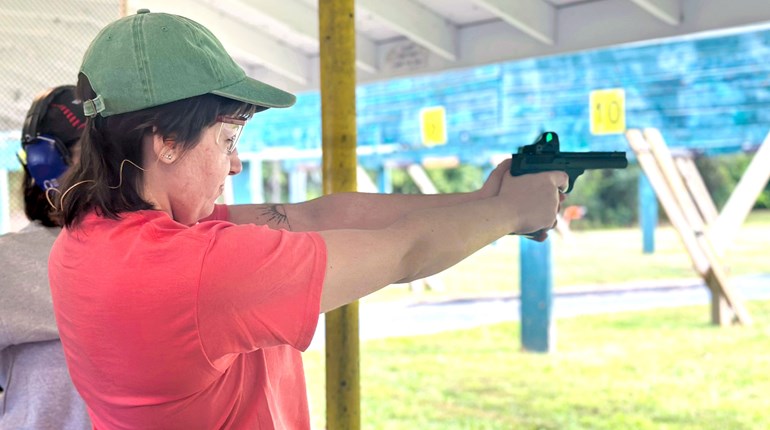
Those of us who carry concealed or keep a firearm at home near our bedside do so primarily because we want to be able to defend ourselves and our families if we are ever faced with a deadly threat—a concept commonly called “self defense.” Instructors, gun writers and random people on the internet throw that phrase around casually, and there’s an assumption in gun circles that if you ever have to use your firearm, obviously it’s going to be a case of self-defense.
There’s a problem with that, though: You don’t get to define what self-defense is. “Self defense” is a legal term with a very specific meaning, and no one—not a top instructor, a lawyer or you—gets to define it. An action is either justified under the legal principles of self defense or it’s not. The self-defense argument gets thrown around a lot, but the words “self defense” aren’t a get-out-of-jail-free card that let you act with impunity. Self defense has a narrow, specific meaning in your state, and you should know what it is.
This gets tricky, because every state defines self defense a little bit differently. Let me go ahead and tell you right now that I’m not an attorney and this is not legal advice—just some considerations so you know what you’re getting into when using deadly force to defend yourself.
Self defense can be claimed when you’re charged with assault, battery or homicide. Understand that it’s a justification-based defense. That means—and listen carefully, because this is important—when you claim self defense, you are admitting that you did the thing you’re being accused of. You’re essentially saying, “Yes, I did it; I committed this act that’s normally considered a crime, but it shouldn’t be considered a crime in my case because I had a good reason.” This is not a guilty plea, but it’s an admission that you committed the act, and that admission can’t be taken back once you’ve made it legally.
When you claim self defense as a justification for whatever you’re being accused of, you are taking the burden of proof upon yourself and your defense team. In a way, you’re no longer innocent until proven guilty, because you’ve admitted that you’re not innocent. You now have to prove that your actions were justified under the law.
Again, this varies by state, but there are four generally accepted principles that help define self-defense. A good threat assessment model will help you analyze a situation in light of these factors. This isn’t foolproof everywhere, but it’s likely not self-defense if you can’t meet all four of these:
1. The attack upon you was unprovoked. Generally speaking, for a claim of self defense to have a chance, you must prove you were faced with an unprovoked attack. If you went looking for trouble and found it, or if you participated in a conflict that escalated—for example, you punched a guy, he punched you back, you pulled a gun on him—your chances of mounting a successful self-defense claim are slim.
2. You faced imminent harm. For a self-defense claim to be viable, you must prove that you were in danger of death or serious bodily injury right then—not earlier and not later. If someone threatens to harm you in the future and you preemptively assault them, you won’t be successful with a self-defense claim because the physical threat to you isn’t happening right then, right there. If someone assaults you and you leave, get your gun, come back and assault them back, you won’t be successfully claiming self defense no matter how much it might make sense in your own head.
3. You responded with an appropriate degree of force. Generally, you can’t claim self defense if you responded to an attack with a grossly disproportionate show of force. Again, this varies, but you can’t respond to non-deadly force with deadly force. This means if you’re in a verbal argument with another woman and she slaps you, you’re not legally justified to pull and use a firearm on her. Assuming she’s about your size, a slap across the face is not deadly force. If the slap or a punch came from a man (men are generally assumed to have a disparity of force over women) or if a woman grabbed you by the hair and smashed your head against a brick wall, it might be a different story. Also, keep in mind that this appropriate use of force applies to the end as well as the beginning of a physical altercation. If you’re assaulted and get into a fistfight and the other party is knocked unconscious, the assault upon you is over. If you continue to strike blows because you’re angry or adrenaline-fueled or whatever else, you’ve gone beyond self defense and into assault. For self defense to be valid, in general, you need to stop when the threat has stopped.
4. You had an objectively reasonable fear of harm. The standard by which your actions will be judged is whether or not a typical, reasonable person in your situation would have believed self-defense was necessary to protect against death or serious bodily injury. Of course, this is a somewhat subjective definition. Note that the reasonable belief is enough—whether it turns out you were in actual harm or not. As an example: If someone says, “I’m going to shoot you,” and reaches his right arm over to his hip and begins to pull out an object, it could be argued that a reasonable person would assume he was pulling a gun, and self defense might be a legitimate justification for your use of deadly force—even if it turns out he didn’t have a gun.
You should know that there are a few exceptions to these four standards, depending on the state. Some states have battered-wife laws that allow a claim of self defense when a woman takes action against an abusive spouse with an exception to the “imminent threat” rule. Many states allow a claim of “imperfect self defense,” which means the defendant had a genuine but unreasonable belief that deadly force was necessary (this unreasonable belief sometimes stems from past trauma). An imperfect self-defense claim can reduce but will not eliminate the charges against you. In addition, you should find out if your state has any of the following:
1. A duty to retreat. This means you are required to, if an avenue is open to you, try to escape from an attacker before you are legally justified to use deadly force against them.
2. A stand-your-ground law. The opposite of a duty to retreat, a stand-your-ground law means you do not have to try to run away from an unprovoked attack before you act in self-defense.
3. A castle doctrine. Based upon the belief that a woman’s home is her castle, residents in a castle doctrine state have the legal justification to use deadly force to protect their home against an intruder.















































